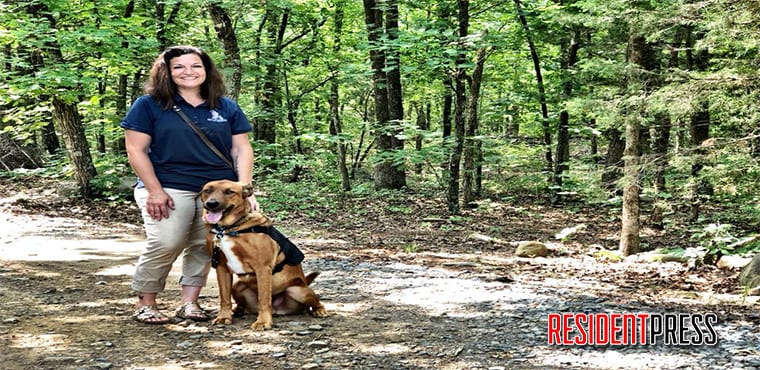**Editors note: Resident Press is publishing this two part feature story on Shilo Schluterman and her service dog Javelin.
Part 1 of 2
By Tammy Moore Teague
Imagine if you will spending a decade and a half in service to your country and being deployed all over the world, only to return home to face the most terrifying battle of all. That battle is within yourself, your mind. It affects every aspect of your life and leaves you paralyzed with fear. This was a reality for Hartford resident and Veteran Shilo Schluterman, who suffers from Post Traumatic Stress Disorder.
Schluterman, a member of the Air National Guard 188th Wing, returned home from Afgahnistan in 2012. She said she didn’t feel like her emotions varied from any other service member returning home from deployment. “I felt uncomfortable, sort of hyper-alert when I first came home but I really thought it would pass. I didn’t know anything was really wrong.”
It wasn’t until Schluterman and her family attended the Hartford Christmas parade that she realized something wasn’t right. “I heard sirens going off,” she recalled. Her thoughts and actions following that moment are obscure from her memory. She does, however, remember trying to convince her husband that they were under attack and that no one realized what was happening. Her husband, Walter, lovingly consoled his wife, convincing her to come out from underneath the bushes behind the bank where she had sought shelter. Schluterman knew she would have normally never left her nieces standing in the crowd unattended. “That’s when I knew something was wrong. I realized I couldn’t trust my own mind. That scared me very badly.”
Schluterman sought help from the clinic at the Fort Smith VA. In January of 2013, she was hospitalized at the Fayetteville VA and diagnosed with PTSD. It was then doctors recommended Schluterman undergo a nine week therapeutic program in Tampa, Florida. This intense program subjects the veteran to prolonged exposure therapy in hopes of desensitizing the brain. Throughout the program patients are monitored closely. “There is a high rate of suicide during or right after treatment,” Schluterman added.
She herself was battling thoughts of suicide. “I called out to God, I just wanted to die.” Schluterman was in a dark, emotional place. “I wouldn’t even leave my house.” Her family grieved as they witnessed her struggling. Her son recalled an incident where he stood at the front door verifying who he was to his armed mother on the other side. “At this time I was on about 14 different medications,” she explained.
Horrific events remain embedded in Schluterman’s memory, even to this day. “I didn’t want to be that female soldier that everyone talked about because someone had to leave their post to come and help me.” Tearfully, she recalled traumatic events that unfolded during a deployment to Afghanistan. Schluterman would work her shift as a production controller, and walk approximately one mile to her residence. Because of the conex housing set up, she would pass through an area of third country national service workers. The USAF staff sergeant found herself without a wingman, and subjected to the foreigners stalking, scoffing, groping and bullying. “They would follow me, step on my feet, grab at me and block me from getting through.”
The battle within herself wasn’t all she was fighting, she was also fighting for her job. A medical transition team had begun processing her retirement. “I didn’t want to retire, I wanted to continue my military career.” Schluterman felt everything she loved slipping away, however God had not turned a deaf ear to Schluterman’s cry for help.
One day an acquaintance, Tracy Cravey, showed up on Schluterman’s doorstep. She was there to deliver an important and life changing message. “God told me to reach out to you.” Schluterman, whose fear and anxiety kept her homebound, began to draw spiritual strength and encouragement from Cravey. Within a month she began participating in Cravey’s ongoing Bible Study. These days yielded strength for Schluterman as she prepared to undergo PE therapy in Tampa.
Following the grueling sessions, Schluterman became involved in a church’s small group program called “Freedom”. The goal of the curriculum was to learn to overcome things that inhibit a close relationship with Christ. Schluterman emerged from the impactful course, reducing her medications from 14 down to eight.
Meanwhile, Schluterman’s psychiatrist had suggested she look beyond traditional medication for help. The program was K-9 for Warriors, and the more research Schluterman did, the more interested she became. “I suggested it to my transition leader, who also had positive things to say about it.” The decision to apply for the program would ultimately become a pivotal point for Schluterman’s future.






